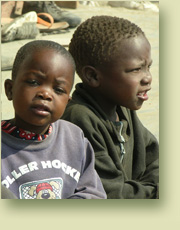|
   

|
 Impact
of a Community-Based Response to the Needs of Orphaned and Vulnerable
Children Impact
of a Community-Based Response to the Needs of Orphaned and Vulnerable
Children
With support from the Rockefeller Foundation, DAL led
an international effort to develop a research protocol for assessing
the effectiveness of aid programs targeting orphaned and vulnerable
children (OVC) in East Africa. DAL facilitated the development
and testing of 17 quantitative and qualitative survey tools; provided
project management for the collection of data in an East African
village; wrote and published a final report; and disseminated
the results among domestic and international government entities,
nonprofit and for-profit organizations (such as the World Health
Organization), and major funders in the area of OVC care.
Findings from the evaluation of the Godfrey’s Children Center
suggest that at least in the short term, children living at the
center were doing as well as or better on measures of psychological,
social, nutritional and educational well-being compared with
other children living in Idweli (orphans living with
extended families and non-orphaned children living with their
parents).
Key findings include:
-
On a standardized measure of depression, orphans
living at the center were about half as depressed as orphans
living in the village, and center orphans were also less depressed
than children living with both parents.
-
Interviews with caregivers indicate that center
orphans appeared to be better taken care of than village orphans,
but the caregivers expressed the belief that the ability of
the village to care for its orphans in general is not as strong
as it once was.
-
During interviews, center orphans expressed a
greater liking for school than did children in the comparison
groups, and center orphans were more likely to see their future
as involving education and study.
-
During interviews, center orphans were more likely
to express a more positive sense of well-being than were village
orphans or village non-orphans.
-
With respect to sustainability, the center appeared
to be becoming more socially integrated into the life of the
village. Most center children visit family on weekends, and
non-center children attend preschool and after-school classes
there. Adult caregivers expressed continued strong support for
the center as a solution to the needs of at least some of Idweli’s
orphans.
|